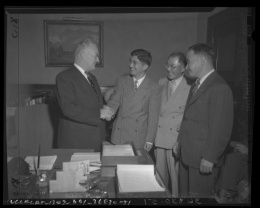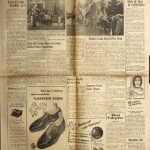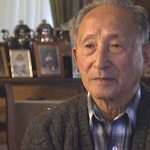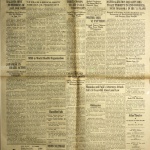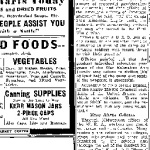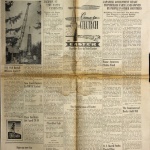Fletcher Bowron
| Name | Fletcher Bowron |
|---|---|
| Born | August 13 1887 |
| Died | September 11 1968 |
| Birth Location | Poway, CA |
Los Angeles mayor Fletcher Bowron (1887–1968) is credited for transforming Los Angeles into a national metropolitan leader; however, his record on race relations, particularly during the World War II era, is less than stellar.
Early Years
Bowron was born in Poway, California, on August 13, 1887, to parents who had migrated from the Midwest. He was the youngest of three children and graduated from Los Angeles High School in 1904. He attended the University of California, Berkeley, from 1907 to 1909, and then enrolled at the University of Southern California Law School from 1909 to 1911. He was admitted into the California State Bar in 1917. When the United States entered World War I, Bowron enlisted in the army and served in the 14th Field Artillery. He returned to civilian life to practice law and married Irene Martin in 1922.
From 1925 to 1926, Bowron served as the executive secretary to California Governor Friend Richardson, who then appointed Bowron to the California Superior Court in 1926. Bowron served as a superior court judge in Los Angeles for the next twelve years until 1938 when he won a recall election against Mayor Frank L. Shaw, whose administration was considered openly corrupt. During the 1941 municipal election, Bowron campaigned in Little Tokyo, and John Aiso was among those who tried to attract Japanese American voters for Bowron. He won the election with an estimated 55% of the vote.
World War II Years
Following Japan's attack on Pearl Harbor on Dec. 7, 1941, Bowron reassured listeners on his weekly radio program that there was no threat of an attack on Southern California shores. However by January 1942, Bowron became one of the early elected officials to call for the incarceration of Japanese Americans, urging that Japanese Americans be moved several miles inland and be put to work for the war effort, such as raising food.
Bowron's change of mind came as a result of sensationalized newspaper stories, allegations of several Japanese submarine sightings off the West Coast and meetings with navy and federal officials, who were concerned with the large Japanese American population on Terminal Island . By the end of February 1942, all people of Japanese ancestry on Terminal Island were given 48 hours notice to leave the area.
On January 27, the Los Angeles County Board of Supervisors discharged all Japanese American county employees and adopted a resolution, urging the federal government to remove Japanese Americans from the coastal areas. Bowron took similar steps and forced all Los Angeles City employees of Japanese descent to take a leave of absence. Bowron's office also embarked on a propaganda campaign to try to control the Japanese American population by encouraging the community to inform on each other and by emphasizing dire consequences for anyone caught committing acts of sabotage. Bowron also met with various representatives from the Department of Justice and army, including with Lt. Gen. John DeWitt . Bowron, like then-Attorney General Earl Warren , newspaper columnist Walter Lippmann and radio commentator John B. Hughs, adhered to the idea of "concerted sabotage," believing that the very fact that no Japanese American had been involved in an act of sabotage meant they were planning one for the future. [1] By February, Bowron was publicly urging the mass removal of Japanese Americans on his weekly radio show.
As a former judge, Bowron knew there would be constitutional problems with any mass imprisonment of Americans of Japanese descent. To get around this, Bowron requested that the Los Angeles Bar Association form a committee comprised of bar members and constitutional law professors to study a congressional action he wanted to submit. Bowron proposed a constitutional amendment that stipulated that anyone holding Dual citizenship with a country that was at war with the United States and descended from immigrants not entitled to U.S. citizenship would be governed by the laws of that foreign country and would not have rights as a U.S. citizen. Additionally, he proposed that the U.S. government be able to circumvent the Selective Service Act and call these people into non-combat military service, regardless of physical qualification, age or sex.
The day that President Roosevelt signed Executive Order 9066 , February 19, 1942, Bowron went on air, suggesting the Parker Indian Reservation on the Arizona side of the Colorado River as a possible detention site for Japanese Americans. He mailed his proposal to U.S. Congressman John Costello and Special Assistant to the Attorney General Tom C. Clark . Bowron, however, protested the federal government's decision to open the Manzanar camp site in the Owens Valley. He unsuccessfully argued that the Manzanar inmates would compete for water supplies with Los Angeles residents. Bowron also opposed a plan floated by several coastal congressmen of requiring everyone in the coastal areas to carry a permit. Bowron thought this would give the rest of the country the impression that California was a dangerous state. Ironically, although Bowron publicly urged the removal of Japanese Americans from Southern California, he wrote in his private letters that he opposed eviction if it "inconvenienced" the larger Los Angeles population. [2]
Meanwhile, thousands of African Americans, primarily from the Deep South, migrated to California during the war to work in the defense industry. Many were restricted in where they could live due to restrictive housing covenants. In Los Angeles, restrictive housing covenants and a housing shortage forced newly arrived African Americans to live in overcrowded, unsanitary living conditions in the empty storefront lots of Little Tokyo, which was renamed Bronzeville by the African American community.
Race relations were further exacerbated when in early 1943, the Zoot Suit riots broke out, with U.S. servicemen targeting Mexican American youths. Rioting went on for about a week and spilled into Bronzeville, with some African Americans targeted. Fearing a race riot might erupt from the African American community, Bowron contacted African American leaders and federal officials in an effort to alleviate the housing crisis and discriminatory employment practices.
Return of Japanese Americans
When the federal government started releasing Japanese Americans from the incarceration camps in 1943, Bowron used his radio program to vehemently oppose their return to Southern California. He felt there could be an outbreak of violence and emphasized that the city could not provide housing or police protection to any returning Japanese Americans. He also continued to publicly advocate that all Japanese Americans should have their U.S. citizenship revoked. In his radio program, he said, "I feel that there are not and never can be such a thing as Japanese-Americans. They are all Japanese, wherever born, and they can never be Americans..." [3] By 1945, however, Bowron realized he could not keep the Japanese Americans from returning and welcomed them back.
Bowron lost his re-election bid in 1953, but until Thomas Bradley was later elected as Los Angeles mayor from 1973 to 1993, Bowron held the record for serving the longest mayoral tenure in Los Angeles City history.
Under Bowron's administration, an active City Planning Department attempted to revitalize the downtown area; the freeway system came under construction; the manufacturing industry expanded and diversified, due in part to the defense industry during World War II; the airport was modernized; and race relations evolved as people of color began to organize politically.
In 1956, Bowron ran for a superior court judge position and served one term, which was six years. In 1962, he retired from the bench but remained active on civic committees.
In his later years, Bowron would admit his regrets and downplay his role in pushing for Japanese American incarceration.
He died on Sept. 11, 1968, when he suffered a heart attack while driving home.
For More Information
Inventory of the Fletcher Bowron Papers, 1934–1970. Henry Huntington Library. San Marino, California.
Bronzeville - Little Tokyo, Los Angeles. "Fletcher Bowron."
Grodzins, Morton. Americans Betrayed: Politics and the Japanese Evacuation . Chicago: University of Chicago Press, 1949.
Sitton, Tom. Los Angeles Transformed: Fletcher Bowron's Urban Reform Revival, 1938-1953 . Albuquerque: University of New Mexico Press, 2005.
Footnotes
- ↑ Morton Grodzins, Americans Betrayed: Politics and the Japanese Evacuation (Chicago: University of Chicago Press, 1949), 132.
- ↑ Fletcher Bowron, February 14, 1942, letter to Congressman John Costello, Fletcher Bowron Papers, Henry Huntington Library.
- ↑ Bowron radio broadcast on KECA, Wednesday, May 26, 1943, 7:45 pm, Fletcher Bowron Papers, Henry Huntington Library.
Last updated Dec. 12, 2023, 6:03 p.m..

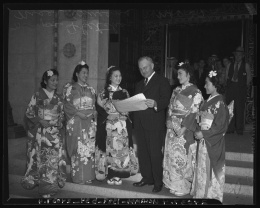 Media
Media
